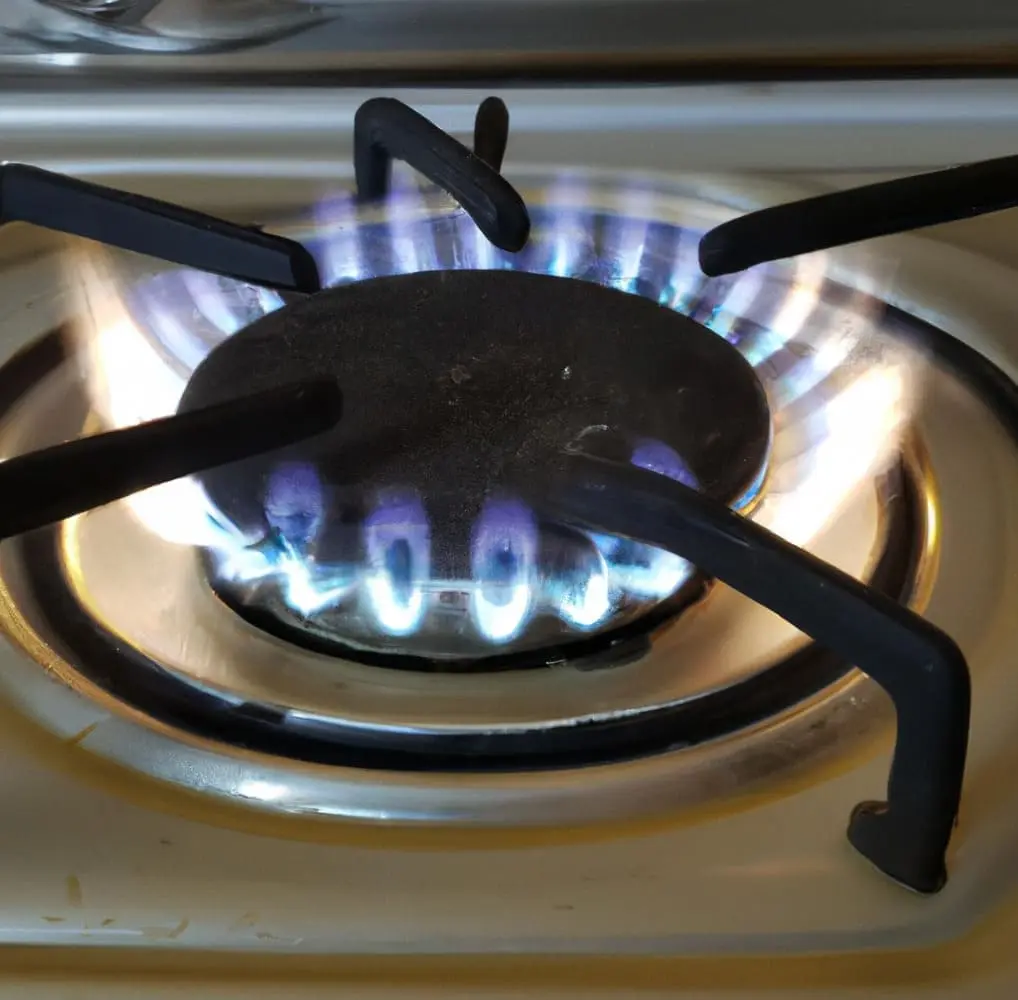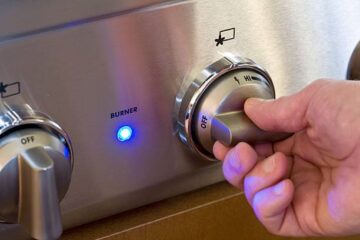Gas stoves are a staple in many households, offering a quick and efficient way to cook food. However, as with any appliance that involves gas, there is always a risk of explosion. Gas stove explosions can cause severe injuries, property damage, and even fatalities. Understanding what causes a gas stove to explode is crucial to preventing such accidents.
This research study delves into the various factors that can cause a gas stove to explode. We explore the science behind gas stove explosions and identify the most common causes, such as leaks, faulty connections, and improper usage. We also examine the steps that can be taken to prevent gas stove explosions, including routine maintenance, proper installation, and regular safety checks.
Whether you are a homeowner, a tenant, or a professional in the culinary industry, this study is a must-read for anyone who uses gas stoves. Increasing awareness and knowledge of gas stove safety can reduce the risk of accidents and ensure a safer cooking experience for everyone.
How do Gas Stoves Work?
Gas stoves use natural gas or propane as a fuel source to ignite flames that heat up the burners or grates on the stove. When you turn the stove knob to the desired temperature, a valve opens to release gas into the burner. The gas mixes with air and ignites when you press the spark igniter or light a match.
The flames heat up the metal grates or burners that distribute the heat to the pot or pan placed on top of them. The size of the flame is controlled by adjusting the knob to increase or decrease the gas flow. When you turn the stove off, the valve closes to stop gas flow to the burner, and the flame extinguishes.
Can A Stove Explode If Left On?

A stove can explode if left on, but it is rare and usually occurs due to specific circumstances. Most modern stoves have safety features that prevent explosions, but accidents can still happen.
Gas stoves are more likely to explode than electric stoves because they use a flammable fuel source. If a gas leak and the stove is left on, the gas can build up and ignite, causing an explosion. This is why it’s essential to ensure that the gas connections are in good condition and that you always turn off the gas valve when the stove is not in use.
Electric stoves can also be dangerous if left on for an extended period. Still, they are less likely to cause an explosion. The risk of an electric stove exploding comes from overheating. If the heating element becomes too hot, it can ignite nearby materials and cause a fire. This is why it’s essential to ensure that there are no flammable materials near the stove and that you don’t leave the stove unattended for long periods.
How Often Do Gas Stoves Explode?
Gas stoves can potentially explode, but it is not a common occurrence. The likelihood of a gas stove exploding largely depends on the maintenance and usage of the stove.
If the gas stove is installed correctly, maintained, and used according to manufacturer instructions, the risk of an explosion is significantly reduced. However, gas leaks can occur for various reasons, such as faulty installation, aging pipes, or damage to the stove. If a gas leak is not detected and the gas builds up to a specific concentration, it can lead to an explosion.
What Causes A Gas Stove To Explode?
Causes of gas stove explosions:
There are several reasons why a gas stove can explode, including:
- Gas leaks can occur due to faulty valves, pipes, or connections: When there is a gas leak, the gas builds up in the room and can ignite with a spark, causing an explosion.
- Improper use of the stove: If the stove is not used correctly, such as leaving a burner on for an extended period, it can cause the gas to build up and ignite.
- Faulty components: Faulty components, such as a malfunctioning regulator or burner valve, can cause an excess of gas to flow, leading to an explosion.
- Poor ventilation: If the room is poorly ventilated, the gas can build up and ignite with a spark, causing an explosion.
- External factors: External factors such as earthquakes, lightning, or other natural disasters can damage gas lines and cause a gas leak, leading to an explosion.
How To Prevent Gas Stove Explosions?
Preventing gas stove explosions:
- Regular maintenance: Regularly maintain your gas stove and have it inspected by a qualified technician to ensure it functions correctly.
- Proper installation: Ensure that a qualified professional install your gas stove correctly and that all connections and components are secure.
- Use the stove properly: Follow the manufacturer’s instructions, and never leave the unattended stove while in use.
- Check for gas leaks: Periodically check for gas leaks by smelling for gas or using a gas detector. If you suspect a gas leak, turn off the stove immediately, open windows and doors, and evacuate the area.
- Keep the area well-ventilated: Ensure the room is well-ventilated when using the stove. Open windows or use a vent hood to remove any gas buildup.
- Use gas detectors: Install gas detectors in your home to detect any gas leaks and alert you to the danger.
- Avoid storing flammable materials: Do not store them, such as gasoline or cleaning products, near the stove, as they can ignite and cause an explosion.
What Can We Do When Gas Stove Explodes?
If a gas stove explodes, it is essential to take immediate action to protect yourself and others. Here are some steps you can take:
- Turn off the gas: Immediately turn off the gas supply to the stove by shutting off the valve behind or near the stove.
- Evacuate the area: If the explosion is severe, evacuate immediately and call the fire department.
- Turn off any open flames: Turn off any open flames, including candles or other stovetop burners.
- Open windows and doors: Open windows and doors to ventilate the area and allow any gas buildup to dissipate.
- Please do not turn on lights: Do not turn on any lights or use any electrical appliances, as they can create sparks that may ignite any remaining gas.
- Check for injuries: Check yourself and others for any injuries and seek medical attention if necessary.
- Call for professional help: Call a qualified technician to inspect the stove and repair any damages.
What Causes A Gas Stove To Keep Sparking?
A gas stove keeps sparking when the ignition system is malfunctioning or damaged. Here are some potential causes:
- Dirty or Wet Ignition Electrodes: If the ignition electrodes are dirty or wet, they may not create the spark needed to ignite the gas. Cleaning the electrodes with a soft brush or cloth can solve this problem.
- Misaligned Ignition Electrodes: If the ignition electrodes are not aligned properly, they may not be able to generate the spark needed to ignite the gas. Adjusting the position of the electrodes can solve this issue.
- Faulty Ignition Switch: The ignition switch sends a signal to the ignition module to generate the spark. If the switch is faulty, it can prevent the spark from being created.
- Damaged Ignition Wires: If the ignition wires are damaged or frayed, they may not be able to carry the electrical current needed to generate the spark.
- Faulty Ignition Module: If the ignition module is faulty, it may not be able to generate the spark needed to ignite the gas.
How Safe Is A Gas Stove?
A gas stove can be safe to use if installed and maintained correctly and used carefully. However, there are some potential safety hazards associated with gas stoves that you should be aware of:
1. Gas leaks
A gas stove is connected to a gas supply, and if there is a leak, it can be dangerous. Natural gas is highly flammable; a tiny spark can ignite it, causing an explosion or fire. To prevent gas leaks, ensure your stove is installed by a licensed professional and all connections are tight and secure. You should also install a carbon monoxide detector to detect leaks.
2. Burns
Gas stoves can get very hot; if you accidentally touch a hot surface or flame, you can get burned. Always use oven mitts or pot holders when handling hot pans or dishes to prevent burns and keep children away from the stove.
3. Carbon monoxide poisoning
Gas stoves produce carbon monoxide, a colorless and odorless gas that can be deadly if inhaled in large amounts. To prevent carbon monoxide poisoning, ensure your kitchen is well-ventilated. Never use your gas stove as a heating source.
4. Fire
A gas stove can cause a fire if flammable materials are left too close to the flame. Keep flammable items such as paper towels, dish towels, and plastic bags away from the stove to prevent fires. Never leave your stove unattended while cooking.
- Left The Gas Stove On Without A Flame? (A Guide)
- What Happens If You Use Propane On A Natural Gas Stove?
How Dangerous Are Gas Stoves?
Gas stoves can be dangerous if not used properly. They can produce carbon monoxide, a colorless and odorless gas that can be deadly if inhaled in high concentrations. Gas stoves can also cause fires if left unattended or if there is a gas leak. Always use a gas stove in a well-ventilated area, keep it clean and maintained, and never leave it unattended while cooking. Installing a carbon monoxide detector in your home can also provide extra safety.
How Long Does It Take For A Gas Stove To Explode?
A gas stove can explode if a gas leaks and a spark or flame ignites the leaked gas. However, the amount of time it takes for a gas stove to explode can vary depending on several factors, such as the size of the leak, the type of gas being used, the ventilation in the room, and the presence of an ignition source.
In general, it is difficult to determine precisely how long it would take for a gas stove to explode because it depends on the specific circumstances. It is important to note that a gas leak can be hazardous and should be addressed immediately to prevent the risk of an explosion or fire.
Bottom Line
All in all, a gas stove can explode due to various factors, including gas leaks, malfunctioning components, and improper usage. It is crucial to take preventive measures, such as regular maintenance, an installation by licensed professionals, and following manufacturer instructions, to minimize the risk of an explosion. If you suspect a gas leak or any other issues with your gas stove, turn it off immediately, evacuate the area, and contact a qualified technician for assistance.
Remember, safety always comes first when dealing with gas appliances; neglecting it can have severe consequences. By staying vigilant and taking necessary precautions, you can avoid the dangers of gas stove explosions and enjoy your cooking experience without any worries.



